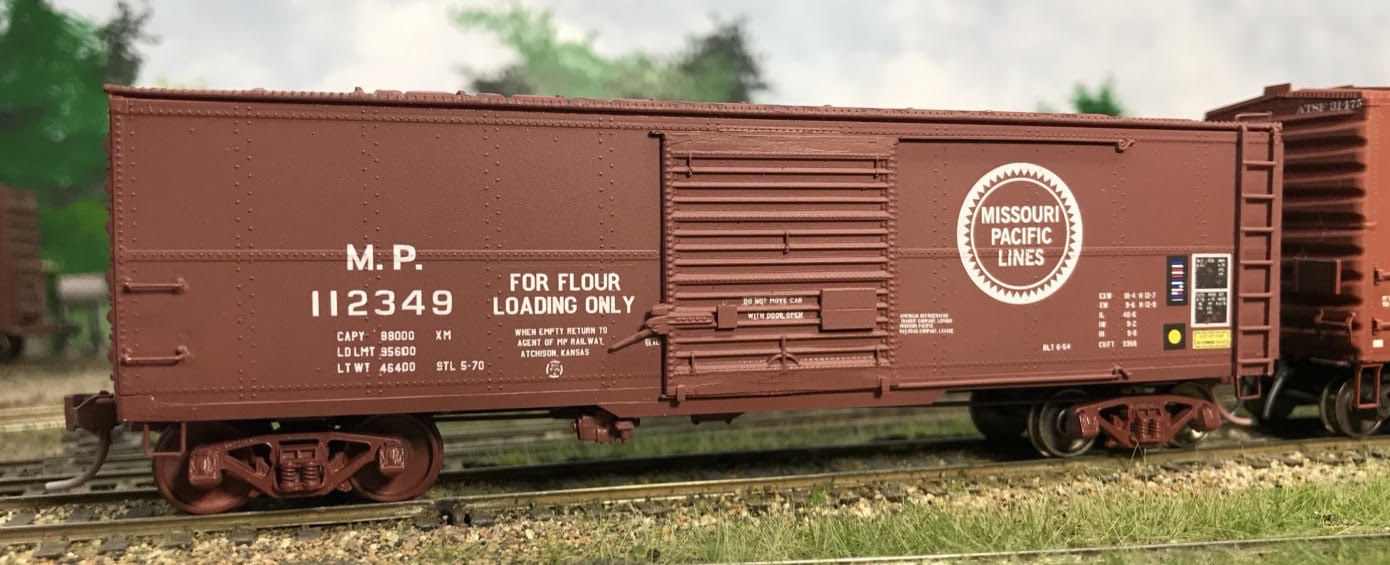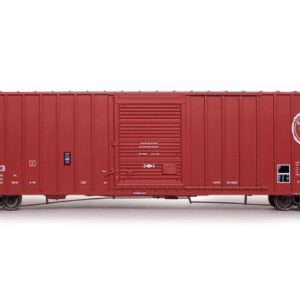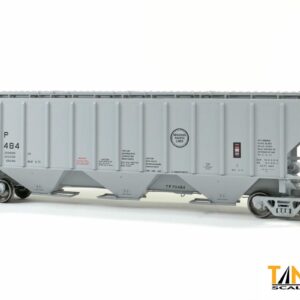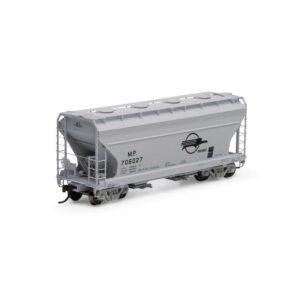This parts package includes the correct 3D printed replacement roof, doors and ends, drill jigs, and decals which are made by Mask Island especially for these cars. Instructions for assembly are posted on our web site – Flour_car_instructions. Modelers will have to furnish an InterMountain reefer kit, a few plastic Evergreen strips and couplers to complete these models. If you cannot locate a reefer kit, we may still have a small supply of the assembled reefers. Our resident modeler, Charlie Duckworth, has discovered that the needed disassembly of the RTR model is possible without too much trouble.
The cars that this model represents were ART ice reefers that were rebuilt into boxcars by the St. Louis ART shops in 1968-1971 These unique cars were seen moving not only flour, but also cement, detergent and some were equipped to haul dynamite. A few cars were converted to MoW service, after being retired from revenue service. These cars all had the signature horizonal rivet seam running the length of the 10 side sheets.
Decal Set

History of the Missouri Pacific 120000, 130000 and 140000 boxcars
Missouri Pacific’s 120000, 130000 and 140000 series boxcars were former 40’ ice bunker reefers that were rebuilt by a number of shops from 1968 through 1975.
Former American Refrigerator Transit (ART) 29000 and 39000 reefers originally built by Mount Vernon Car Company in 1952 were rebuilt by the ART shops in St. Louis from 1971-1972 to series MP 112600-113084. Externally the ice hatches and running board were removed and a 8’ wide and 8’ 4” high opening was made for new Youngstown freight doors. The 112000-112599 were originally ART 91300-91699and 39300 through 39699 (former TRAX 12000-12599) built by Pacific Car & Foundry in 1954. A group of N&W boxcars were also modified from this series being numbered N&W 49170-49219. Pacific Car & Foundry built another group in 1957 ART 37000-37249 and these were converted to boxcars by St. Louis Refrigerator Car Company (MP 113085-113159) and the ART shops in St. Louis (MP 113160-113334). These cars all had the signature horizonal rivet seam running the length of the .10” side sheets.
Although not related to the prototype of this kit, a part of this rebuilding program was a group of reefers bought from Fruit Growers Express (FHIX 41241-41460). These were built by Pacific Car and Foundry in 1956 and rebuilt by St. Louis Refrigerator Car Company in 1974-1975 in the MP 114330-114679 group. The last group (Pacific Car and Foundry in 1957) were purchased second hand in 1972 from Packers Car Line (PCL 4000-4399) and converted by Midwest Freight Car, Clinton, Illinois into boxcars MP 114000-114329 in 1972 and 1973. Initially the cars were assigned to flour, cement and detergent loading with some being used to haul explosives. A few cars were converted to MoW service after being retired from freight service with one car being repainted as HERBIE 1 to promote safety on the Union Pacific.
Background on the Model
The model was initially conceived as being a one-piece resin body and a pilot body shell was made by Charlie Duckworth for casting from a 1954 ART kit designed by Stan Rydarowicz. After the body was completed, contact was made with a resin caster but the price per casting put the project to the point where the models would overly expensive and the MPHS would see little profit. Charlie then looked into using the existing Intermountain ART reefer kits the Society had on hand, and having the correct diagonal panel roof, “roller pin’” style ends and 8’ wide Youngstown doors made as replacement parts. MPHS member Mike Huddleston was contacted and Mike volunteered to design and print the replacement parts for this project. Charlie also contacted Hubert Mask and Mask Island decals were made specifically for this kit and allow for prototype stenciling showing “Flour Loading Only,” “Cement Loading Only,” and “Detergent Loading Only”. Hubert also added multiple re-weigh locations on the MoPac and other variables seen on these cars.
Being only 13’ 7” from the top of the rail to the top of the roof make these models considerably shorter than other 40’ boxcars built in the late 1930’s through the 1950’s and add a nice variation to a train consist, class yard or an industry track.
Prototype photos


Model Photos

Model by Charlie Duckworth





